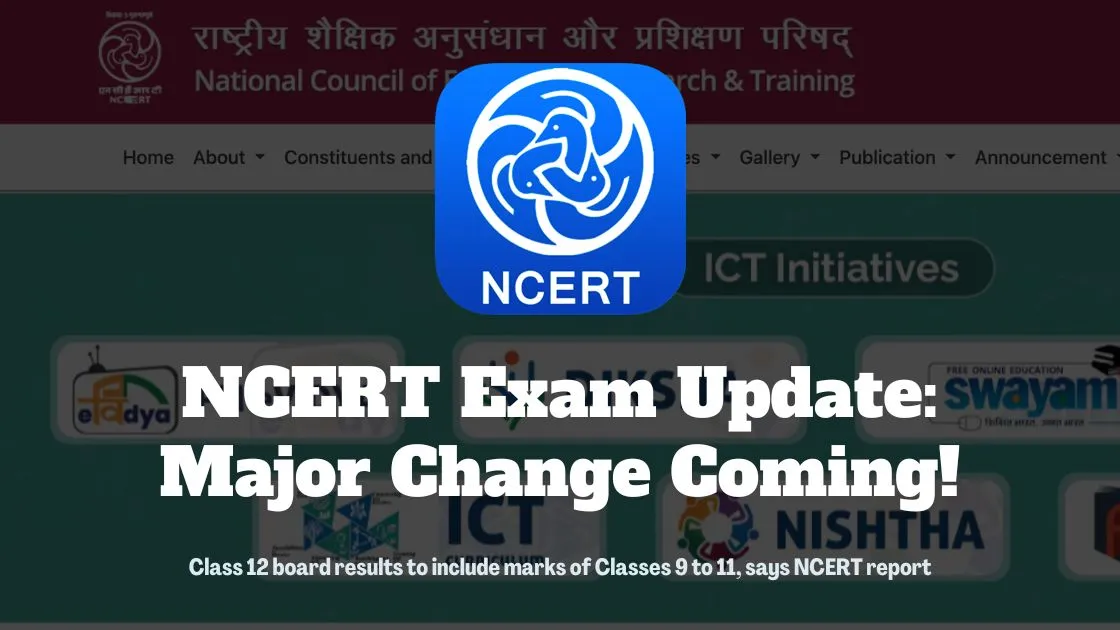NCERT’s New Board Exam Model: Class 12 Results May Depend on Class 9 to 11 Marks!
The National Council of Educational Research and Training (NCERT) has proposed a transformative change to the Class 12 board exams, which will integrate marks from Classes 9 to 11 and place a stronger focus on vocational and skill-based education. This overhaul aims to standardize board assessments across India and foster a more holistic learning experience for students.
Integrating Marks from Classes 9 to 11
The NCERT report, titled “Establishing Equivalence across Education Boards,” proposes a new model for evaluating Class 12 students by considering their cumulative performance from Class 9 onwards.
According to the report, 15 percent of the marks will come from Class 9, 20 percent from Class 10, and 25 percent from Class 11, making a total of 60 percent of the final Class 12 result influenced by previous years’ performance. This change is designed to encourage continuous learning and reduce the stress associated with the final board exams.
This recommendation was submitted in July 2024 by PARAKH (Performance Assessment, Review, and Analysis of Knowledge for Holistic Development), a regulatory body established by NCERT, to the Ministry of Education. The move comes after detailed discussions with 32 education boards across India, ensuring that the model aligns with the goals of the National Education Policy 2020 (NEP 2020).
Focus on Vocational and Skill-Based Education
The proposal highlights the need to incorporate vocational and skill-based subjects into the school curriculum, emphasizing subjects like Data Management, Coding, Application Development, Artificial Intelligence, Music, Arts, and Crafts. This shift aligns with the goals of NEP 2020, aiming to equip students with skills relevant to the evolving job market and foster holistic development.
By mandating vocational subjects, the NCERT aims to ensure that students acquire both academic knowledge and practical skills that will serve them in higher education and future employment. This initiative will contribute to creating well-rounded individuals who are prepared to navigate various career paths.
Assessment of Teachers and Infrastructure Enhancement
In addition to student assessments, the report stresses the need to assess teacher performance and improve school infrastructure. This includes ensuring access to potable water, well-stocked libraries, and proper sports facilities, which are crucial to creating a supportive learning environment. These infrastructure improvements are necessary to enhance both the academic and personal development of students.
New Weightage Distribution for Board Exams
One of the most significant changes proposed by NCERT is the new weightage system for board exams. Here’s how the final Class 12 result will be distributed:
- 15 percent from Class 9 performance
- 20 percent from Class 10 performance
- 25 percent from Class 11 performance
- 40 percent from Class 12 performance
The evaluation for Class 12 will be split into formative and summative assessments. Formative assessments will focus on self-reflection, student portfolios, teacher assessments, project execution, and group discussions, while summative assessments will consist of the traditional term-end exams.
Weightage Breakdown for Classes 9 to 12
Each class will have its unique distribution of formative and summative assessments:
| Class | Formative Assessment | Summative Assessment |
|---|---|---|
| Class 9 | 70% Formative | 30% Summative |
| Class 10 | 50% Formative | 50% Summative |
| Class 11 | 40% Formative | 60% Summative |
| Class 12 | 30% Formative | 70% Summative |
This system aims to make the evaluation more comprehensive and reflective of the student’s overall learning journey rather than focusing solely on high-stakes exams.
Introduction of a Credit-Based Learning System
Another significant shift proposed by NCERT is the introduction of a credit-based system for Classes 9 to 12. Students will need to accumulate subject-specific credits to complete their education:
- Classes 9 and 10: Students must accumulate 32 credits out of a possible 40.
- Classes 11 and 12: Students must earn 36 credits out of a possible 44.
The additional credits can be earned through online courses, such as MOOCs (Massive Open Online Courses), or by engaging in research and community-based projects. This approach will offer students more flexibility in their education, allowing them to explore areas of interest and develop a wider range of skills.
Here are the most important key takeaways from the proposed changes in the NCERT report:
Cumulative Assessment Model: Marks from Classes 9 to 11 will contribute to 60% of the final Class 12 board results.
Vocational and Skill-Based Education: Vocational subjects like Data Management, Coding, and Arts will become mandatory to promote holistic development.
Formative and Summative Assessments: Class 12 will be evaluated with 30% formative (projects, discussions, teacher assessments) and 70% summative (traditional exams) assessments.
Credit-Based Learning System: Students must accumulate subject-specific credits through coursework, online learning, and projects across Classes 9 to 12.
Focus on Infrastructure and Teacher Assessment: The report emphasizes improving school infrastructure and teacher performance assessments to create a better learning environment.
Alignment with NEP 2020: These changes are in line with National Education Policy 2020, aiming to provide students with practical skills and well-rounded education.
Conclusion
The NCERT’s proposed assessment model represents a significant step towards standardizing education across India while promoting a more well-rounded learning experience for students. By incorporating marks from Classes 9 to 11 and emphasizing vocational training, the model aims to prepare students for both academic and practical challenges.
As the education system evolves, these changes are expected to provide students with a more balanced approach to learning, equipping them with the skills and knowledge they need for the future. The Ministry of Education and PARAKH are working closely with education boards across the country to ensure smooth implementation of these recommendations.
For the Latest Educational News (CBSE, ICSE, and State Board News) and live news updates, like us on Facebook or follow us on Twitter and Join our Premium Telegram Channel. Read more on Latest Exams & Results News on Shikshapress.com.

